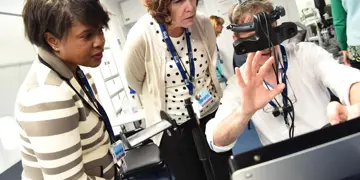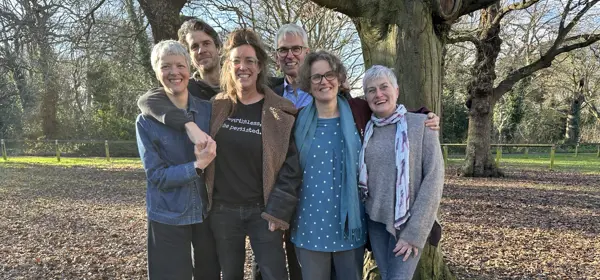It happened to me: reaching for the stars
It happened to me: reaching for the stars
Aboard the Orbis Flying Eye Hospital where trainees simulate surgery
It is not every day that you get to work with an astronaut.
Joan Higginbotham, an outstanding electrical engineer, flew as a mission specialist to the International Space Station in 2006.
When you’re training to be an astronaut, there is a huge emphasis on simulation training. Not surprising, really, given the perilousness of space travel. Just as we wouldn’t want new astronauts to be launched into space without practising first, simulation also allows surgeons to practise in a controlled environment. So, it was a real pleasure to have Joan with us for an Orbis Flying Eye Hospital trip to Peru in 2018, the first week of which was dedicated to simulation training.
Orbis is an international eye-care charity which has been a pioneer in the prevention and treatment of avoidable blindness for more than four decades. The Flying Eye Hospital, which on the outside looks like any other aircraft, is a state-of-the-art accredited ophthalmic teaching hospital. It goes all over the world, and the volunteer faculty – mostly ophthalmologists, anaesthetists and nurses – travel to those places to train the local eye-care team on the aircraft and within a local hospital.
With Tom Oetting, a professor of ophthalmology from Iowa, we taught on the aircraft and in local hospitals, with first-, second- and third-year trainees. The Orbis nurses were training local nurses, the anaesthetists were training local anaesthetists, and live surgeries were performed in the final week of the project.
We were teaching the local eye-care teams cataract surgery, strabismus surgery, glaucoma and oculoplastic surgery. We also taught corneal surgery and laser treatments. It was a combination of virtual reality simulation, with the high-tech simulation kit on the aircraft, but also low-tech simulation with model eyes, which can be used to practise almost all of the steps involved in most common eye operations.
Joan, who was there with UTC Aerospace Systems, which partnered with Orbis for the project, watched the simulation training and then tried it herself, and wasn’t bad at all. Joan was able to see Orbis’s effect, because the third-year ophthalmology students, whom we had taught in the morning how to do strabismus surgery, were now confident enough to teach the first-year trainees, who had arrived after lunch. The students were even using the exact same phrases we had been using to teach them.
Joan said to me: ‘There’s your legacy – within the first morning of the trip.’
I’ve been on two projects with Orbis, the second being in Chile in 2019, the year after the Peru trip. The team spirit has always been terrific. What I particularly like about Orbis is the way it adds value. If you can teach 10 local surgeons how to do a procedure, and how to teach others to do it, it means thousands will go on to be carried out. I have also learnt a great deal from my fellow medical volunteers, which I have brought back with me.
The biggest impression my Orbis trips have left on me has been the level of enthusiasm the trainees have for learning. It is tremendously rewarding to see the progress they make in such short periods of time. Back in the UK, I strive to encourage that same level of enthusiasm in my trainees.
John Ferris is a consultant ophthalmologist based in Gloucestershire
It happened to me is a column dedicated to doctors’ experiences in their working lives




